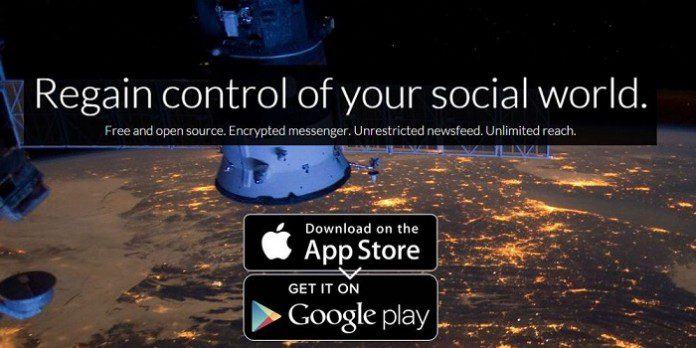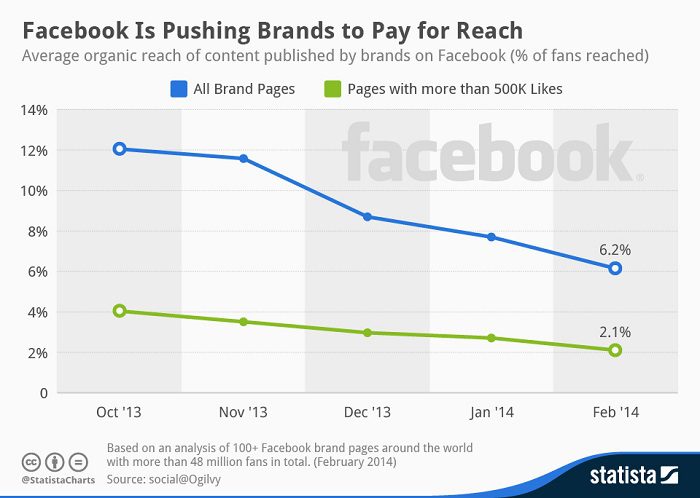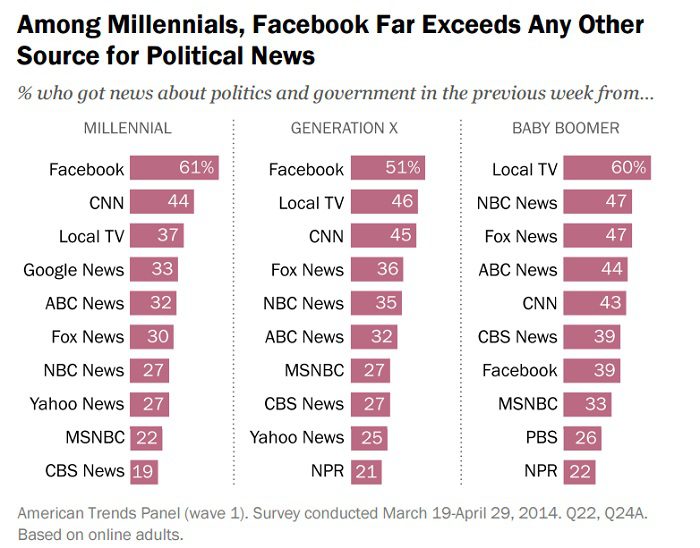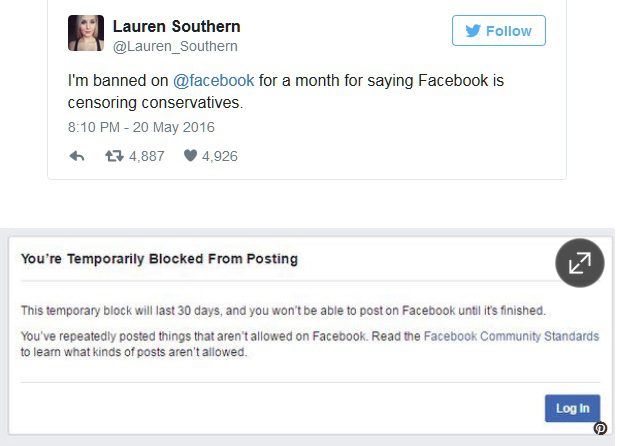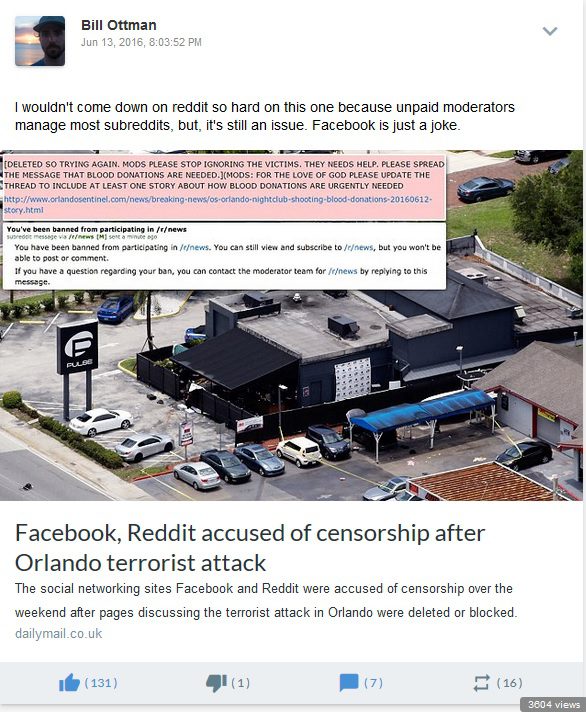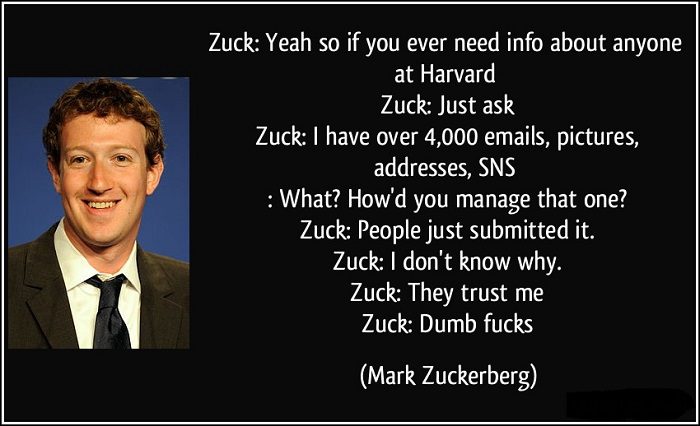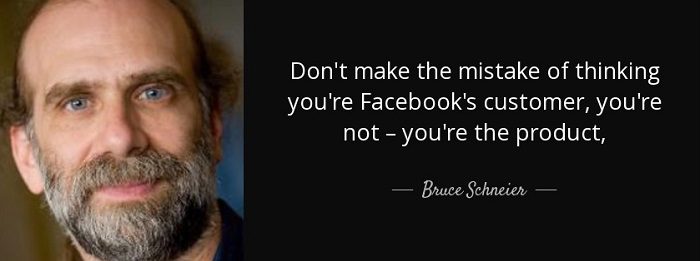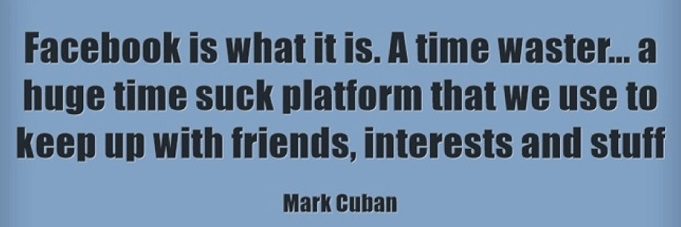In under a decade, Facebook went from a start up in Mark Zuckerberg’s Harvard dorm room to a multi-billion dollar juggernaut that revolutionized the way the world interacts online. Friends and family from all over the world can stay in touch and communicate in a way that was not possible before Facebook was created. Yes there were other social networking sites before Facebook, but Facebook took it mainstream. For that, Facebook (and the internet) should be applauded. We can argue the pros and cons of social media another day, but the human connectivity aspect of it has to be considered a positive byproduct of social media.
Facebook not only connected the world but it also redefined how most of us consume information. In fact, one of my favorite features of Facebook was that it allowed me to choose the content I liked (via liking/following pages) and placed it all in a nice neat package in my news feed. I use social media first and foremost to aggregate content that interests me. Before Facebook was popular, I had go to the many websites that I followed to get the information I was looking for, but on Facebook, that information came to me via my news feed. It is a very simple concept: I like their pages (become a follower) and receive all of the page’s content.
In 2012 the news feed was changed when Facebook decided to restrict organic reach in an effort to get its users to pay for additional impressions. So as time went by, Facebook users received less and less of the content from the pages they liked. This decision was particularly frustrating for people who put a lot of time and effort into growing their followers, as well as the many people who already paid Facebook to promote their page and to acquire many of their followers. For years, Facebook encouraged their users to invest their time and money to build up their followers so they could expand their reach. Some of these prolific Facebook users helped build the site to what it is today, but Facebook penalized those users for doing exactly what the company told them to do. Now only a fraction of their followers see their content and the only way to get more impressions is to pay Facebook every time.
But Facebook is a Business
Facebook is a business and they have a fiduciary responsibility to their investors and shareholders, I get it. But is this how Facebook should look for revenue? Didn’t Facebook have other revenue sources to turn to before restricting their users from reaching their own followers? Isn’t the whole purpose of social media to build and communicate with your subscriber base? What is the point of liking a page if we are not going to receive its content? Facebook’s decision to restrict their users’ organic reach was not only ethically questionable, but directly contradicts the company’s so called mission to make the world more open and connected.
Facebook may be pulling off one of the most lucrative grifts of all time; first, they convinced brands they needed to purchase all their Fans and Likes — even though everyone knows you can’t buy love; then, Facebook continues to charge those same brands money to speak to the Fans they just bought.” — James Del, Gawker
Facebook Is Overcrowded
Facebook’s growth over the last 10 years has been nothing short of incredible. However, this type of growth creates its own challenges. Facebook has 1.59 billion visitors every month and there are over 50,000,000 businesses on the platform creating content every day. This has forced Facebook to deal with issues regarding the volume of content their users are generating. In addition to the content issues, the longer a person is on Facebook, the more friends they acquire, the more posts they upload and share and the more pages they like. Eventually the user accumulates too much content to fit into their feed. Facebook developed complicated algorithms to provide what they think their users will like based on user history. This has really changed the model that made Facebook such a success. In this sense, Facebook was a victim of its own success. More content was generated than everyone could see. This has also contributed to less organic reach and experts predict that it’s only a matter a time before organic reach for a Facebook page will hit zero (which is really not far to go to from here).
Is There Still Value on Facebook?
If you have a robust marketing budget, Facebook can have some value because that’s where all the people are, but that’s not really social media anymore – that’s advertising – and there’s a big difference between the two. We’ve all seen sponsored posts in our news feed on Facebook — do we actually believe they are as effective as the posts that organically reach our followers? Keep in mind that on average, the click through rate with sponsored ads on Facebook is .05% whereas the Google Ads click through rate is 2%.
For the brands that were actually providing valuable content and which were regularly engaged with their followers on social media, the value of having a Facebook page has greatly diminished. Why would anyone spend time and money building a following on Facebook when they can only reach a fraction (or possibly none) of their followers organically? For smaller brands or non profits, the return on their investment of time and effort is just not there, especially for the ones that provide free content to their followers.
It may be wise to keep a presence on Facebook and periodically update to keep your page fresh, but I wouldn’t put too much effort beyond that unless I was to run a sponsored ad. For all intents and purposes, Facebook is not a social media site anymore, it’s an overpriced marketing platform that produces mediocre results in most cases.
Why Is Social Media So Important?
When most of us think of social media, we do not consider its potential impact on our lives. We see social media as innocuous online networks that conveniently connects us with our friends and loved ones, but we rarely consider the implications of subscribing to such a technology. Social media has become the way that most people consume information and thereby, it has the power to profoundly influence our behavior and decisions and even our perception of reality. Facebook has a captive audience of almost 2 billion people which is basically most of the developed world. If you don’t think that has any significance or societal impact, you are underestimating the social media phenomenon. A social media network the size of Facebook has the ability to influence the collective consciousness of this planet in a very real way.
The chart below is from an article titled, “Why Facebook’s algorithm matters: because 60% of millennials get news there.” As the chart illustrates, younger generations are increasingly turning to Facebook for their news.
Facebook Censorship
With so much of the worlds population now getting their information from social media sites, censorship and agenda driven editorial abuse is a real issue. We must not forget that Facebook is under no obligation to comply with constitutionally protected free speech laws. Its up to Facebook’s outsourced moderators and vague guidelines to determine what over a billion and a half people get to see. To be fair, much of the moderating that’s done on Facebook is to keep the site PG-13 so to speak, but it seems as if ideological influences have also been a factor. Most recently we have seen this as it relates to political censorship.
An article published in The Harvard Law Review Forum titled “The Brave New World of Social Media Censorship” gives us a better idea of the kind of power a company like Facebook has. Here are a few excerpts:
“— private companies that run social media sites and search engines are the main arbiters of what gets communicated in the brave new world of cyberspace. And despite their good intentions and their claims to a free-speech-friendly philosophy, these companies employ “terms of service” that censor a broad range of constitutionally protected speech.”
“Professor Ammori tells us that Facebook lawyers have created “a set of rules that hundreds of employees can apply consistently without having to make judgment calls.” The details of these rules, however, we do not know. Unlike censorship decisions by government agencies, the process in the private world of social media is secret.”
“Facebook,” as Jeffrey Rosen has said, wields “more power [today] in determining who can speak . . . than any Supreme Court justice, any king or any president.”
Facebook is the Most Censored
In an article titled “Does Social Media Have a Censorship Problem?” Jillian York, the director for international freedom of expression at the Electronic Frontier Foundation, had this to say about censorship in social media:
“Legally we have no right to be heard on these platforms, and that’s the problem, as social media companies become bigger and have an increasingly outsized influence in our lives, societies, businesses and even on journalism, we have to think outside of the law box.”
In 2015, York co-founded Online Censorship, a user generated platform created to document content takedowns on six social media platforms (Facebook, Twitter, Instagram, Flickr, Google+ and YouTube). Online Censorship released a report in March of 2016 which found Facebook to be by far “the most censorious platform.”
Moderation to keep Facebook safe for its younger users is certainly understandable and just good housekeeping. But censorship designed to conceal a social, political or other agenda is another issue altogether and a regressive practice. Does Facebook really think that employing this type of censorship is the best way forward in the 21st century? One of the main reasons that so many people go to the internet is because they are tired of the highly censored corporate-owned mainstream media. This is also one of the reasons why the major news networks’ viewership and public trust levels are at all-time lows, particularly with younger audiences. Is this the model that Facebook wants to emulate?
Other Facebook Concerns
Facebook has received plenty of criticism in recent years regarding the company’s behavior and policies. In 2012 Facebook performed a controversial social experiment in which they proved they could manipulate their users’ emotions using the content that appeared in their news feed. There was even a study published on the results. But, by doing so, they crossed a line and lost the trust of many of their users. Here is another experiment Facebook did on its users to test their loyalty. We also learned a few years ago that Facebook tracks its users non-Facebook online activity. This means that Facebook keeps track of our internet behavior and all the external websites we visit.
Did you know that Facebook is using artificial intelligence called “Deep Text” to track our every written word too? Is Facebook listening to us through our smartphone mics? Facebook says it does, but only to help provide better service. I guess now we know why Mark Zuckerberg taped up the mic on his own computer. If that’s not disturbing enough, another one of Facebook’s features is their facial recognition software, which is thought to be more effective than the FBI’s version of the same type of software. There is even a lawsuit challenging the legality of such software. Here are some excerpts from the above linked articles:
“Facebook says explicitly on its help pages that it doesn’t record conversations, but that it does use the audio to identify what is happening around the phone. The site promotes the feature as an easy way of identifying what you are listening to or watching, to make it easier and quicker to post about whatever’s going on.”
– The Independent
“At the end of the day, Facebook’s facial recognition technology is downright creepy. Opting out of the service doesn’t mean Facebook will stop trying to recognize your face–it just means that Facebook will stop suggesting that other people tag you. Even Google has noted the utter creepiness of facial recognition technology (though I suspect they’re just waiting for Facebook to get burned).”
– PC World
Facebook says all this tracking is done to better serve its users, but there can be no doubt that this is extremely intrusive behavior from a private company towards its subscribers. What personal cost must a Facebook user pay for better service? If another company tried invade our privacy like this we would be up in arms, but with Facebook its seems to be okay with most people.
How Does Facebook View its Community?
Don’t let Mark Zuckerberg’s baby face looks fool you. He is a very intelligent, intensely driven, shrewd businessman who is well aware of the power of information. It is no secret that Zuckerberg is constantly challenging the personal privacy rights of his users, but even he himself has acknowledged that his users may be unwise to trust him with their data. Apologists for Zuckerberg have said it was a youthful indiscretion when he called early Facebook users “dumb fucks” for trusting him with their information. I’m sure if he had to do it over he would probably choose his words more wisely. However, that exchange gave us insight into how he viewed the early Facebook community. It also showed his knowledge of the importance of data, as well his willingness to offer up his users’ information right from the start. As we see with Facebook’s behavior and policies, this basic lack of respect for his users is still going on to this day.
Ironically, or rather, hypocritically, the man who says privacy is no longer the social norm, spent more than $30 million on four houses that were adjacent to his home in Palo Alto. His reason? Because he wanted privacy. He was also recently caught putting tape over his laptop’s camera and microphone. A classic example of do as I say, not as I do.
What is Facebook’s Philosophy?
Mark Zuckerberg tells us “mission trumps money” at Facebook and he wants to “make the world more open and connected.” Those are nice, altruistic sounding catchphrases, but I think it’s more important to look at Facebook’s actions instead of the carefully crafted sound bites from their founder. As we have seen in the previous sections of this article, this mission is certainly not reflected in Facebook’s actions. Its seems more likely that having now monopolized the largest portion of the internet, Facebook wants to be the gatekeeper of what you see and hear while monetizing connectivity. Technology brought us forward in the 21st century and now Facebook brought us back to a 20th century model.
If Facebook would perform psychological experiments on their users, what else would they do? Is this a company that you trust with all your information, where you go and who you associate or talk with? Do you trust Facebook with your personal communications exchanged in messenger? Do you trust them to safeguard every written word you type? Am I the only one who thinks it’s super creepy that a social media company can listen to us through our smartphone? The only philosophy that is evident is that Facebook seeks to track, collect, exploit and monetize under the guise of better serving their users.
If You Don’t Like It – Don’t Post on Facebook
There is a strong argument to be made that if you do not want your information to be used or made public, don’t post your whole life on Facebook. While I generally agree with that line of thinking, whats happening at Facebook goes beyond just the content you post. These are issues that should concern people as we go further into the information age and big data is utilized more ubiquitously. What may not be a problem now could come back to haunt you in years to come, when least expected.
In an article titled “Why I’m Quitting Facebook” author and CNN contributor, Douglass Rushkoff sums up Facebook when he had this to say:
“Today, I am surrendering my Facebook account, because my participation on the site is simply too inconsistent with the values I espouse in my work. In my upcoming book “Present Shock,” I chronicle some of what happens when we can no longer manage our many online presences. I have always argued for engaging with technology as conscious human beings and dispensing with technologies that take that agency away.”
“Facebook is just such a technology. It does things on our behalf when we’re not even there. It actively misrepresents us to our friends, and worse misrepresents those who have befriended us to still others. To enable this dysfunctional situation — I call it “digiphrenia” — would be at the very least hypocritical. But to participate on Facebook as an author, in a way specifically intended to draw out the “likes” and resulting vulnerability of others, is untenable.”
“Facebook has never been merely a social platform. Rather, it exploits our social interactions the way a Tupperware party does. “Facebook does not exist to help us make friends, but to turn our network of connections, brand preferences and activities over time — our “social graphs” — into money for others.”
“We Facebook users have been building a treasure lode of big data that government and corporate researchers have been mining to predict and influence what we buy and for whom we vote. We have been handing over to them vast quantities of information about ourselves and our friends, loved ones and acquaintances. With this information, Facebook and the “big data” research firms purchasing their data predict still more things about us — from our future product purchases or sexual orientation to our likelihood for civil disobedience or even terrorism.”
What Exactly is Facebook?
In the same way that some believe that Mark Zuckerberg’s recent $45 billion donation was for charity and not an investment vehicle, the average person on the street also thinks that Facebook exists to connect them with their friends and family. Sure, maybe that’s how Facebook started but it is not what it is anymore. In reality, Facebook is a marketing site which happens to be the world’s largest human data mining platform where any and all of your information will be used however the company sees fit. Make no mistake, on Facebook, we are the product.
What is Minds?
Minds.com is a social media networking site which would have to be characterized as the antithesis of Facebook. Minds basically took all the issues that people do not like about Facebook, both operationally and philosophically, and fixed them. Minds was only formally launched in June of 2015 and is still in beta mode. Even so, the network has gained significant traction from an extremely loyal subscriber base. Here is just one Minds user’s feelings about the site but it is the typical sentiment of many of their users, myself included:
“I haven’t left Facebook, but only because it’s my only connection to much of my family. The truth is, Facebook is manipulated. The information you receive is censored, twisted, and aggressive. A person’s deep, intellectual thoughts on life are lost in the trends of the moment. Social media has the potential to be the digital nervous system of the entire human species. Social media can connect the entire planet and bring various cultural traditions and philosophies to a place where all can comprehend. I came to Minds.com looking for this concept, and have absolutely found it.” – @stoneman2103
How Minds is Different from Facebook
Organic Reach
Minds does not limit your organic reach. When you post something on Minds it will go into the feed to ALL of your followers. Minds promises to never change this policy.
Privacy
Minds says you can log on anonymously if you want and you don’t even need a real email address (although in their in their privacy policy they reserve the right to collect your real info under certain circumstances). Minds has an encrypted chat feature which the company states it has no access to. On Minds your email and password is encrypted too.
Open Source
Minds is an open source platform which means that they document and publish their source code for all to see. Open source allows for transparency and lets Minds users see how the platform/app interacts with their data. It also allows the community get involved and take part in the evolution of the platform. When the code is fully developed and complete it can be found on minds.org
Uncensored
Minds does not censor their user’s content (Assuming it’s not illegal?). Minds allows explicit content but it must be labeled/tagged and the images are obscured by blurring. Explicit content cannot be boosted (promoted) either.
Minds Digital Currency
The digital currency or point system is one of the features that really set Minds apart from other social media sites. While most of the other sites are limiting organic reach, Minds is actually allowing its users to expand theirs. This is how it works. On Minds, you’re rewarded with points for participating on the site. The Minds version of a Facebook like is a vote, but with Minds you can up vote or down vote a post. Every time you vote (up or down) someone’s post or someone votes on your post, you receive a point. When you comment on a post you receive a point. When you subscribe to a channel you receive a point. When you log in you get 50 points (limit 1x per day) and every time you update your status or post content you receive 10 points. The points are deposited in your bank or wallet found in the user dashboard.
These points are used to boost your content beyond your subscriber base. In some cases, other Minds users will boost your content if they like it or offer you points to share theirs. You can also buy extra points from Minds at a cost of $10 per 1000 points. If you’re active, the points will rack up quickly, allowing you to boost your content to a much larger audience. Just by logging in every day, you’ll net 1500 points per month. Each point equals one view so you will have 1500 views in the bank. Try and get 1500 views your first month on Facebook. That’s not going to happen.
Boosting Content
Boosting posts (promoting your posts beyond your subscriber base) on Minds is much easier than it is on Facebook. Facebook restricts what you can boost/advertise in any number of ways. In my experience, Minds does not restrict you at all. I have never had a post not make it through the Minds review process, but with Facebook my posts have been kicked back many times, and for many different reasons, some of which made no sense at all.
Monetization
Minds is currently set up for peer to peer advertising. Points can also be used to barter for services with other Minds members. From my understanding, Minds future plans are to give their users the ability to sell their points for currency or crypto-currency such as Bitcoin.
Blog Feature
Another very cool feature on Minds is their blogging format. On Minds you can write, publish, and distribute your own content using their unique blog component. Minds even pays people to blog on the Minds platform.
The Minds Platform
When you log into Minds you’ll find that the format is similar to Facebook, except on Minds you can post larger images in the feed and homepage (only seen in desktop) which looks better in my opinion. Minds also has a cleaner, and less cluttered appearance. The desktop version and mobile app are intuitive, responsive and they run smoothly. The digital currency and boosting features make the site extremely fun to use, and borderline addicting.
The Minds Community
Generally speaking, the Minds community is a more socially aware and awake audience than you’ll find on Facebook. Many of the Minds users are part of a growing subculture of people who are increasingly aware that the consolidation of wealth and centralization power that has taken place in the last 100+ years, does not benefit humanity as a whole. Most Minds users see past the mainstream medias scripted narratives and have a healthy sense of skepticism about information and its sources. If I had to name a predominant theme on the site it would have to be individual freedom. There are many wonderful artists and content creators from all walks of life on Minds. They post music, art, thought provoking articles, videos, gifs, clever memes, and weekly podcasts discussing a wide variety of topics. The Minds founders are frequently on the platform interacting with their users. The Minds users are proud to support the Minds founders and their mission. Being a part of the Minds community kind of feels like belonging to a special club.
The Minds User Experience
Minds is very different than Facebook in regard to user experience. The best way I can describe it is to say that, Facebook is like reading a tabloid magazine and Minds is like reading a personal development book. Another way to put it is to say that Facebook is centered around people while Minds is more about ideas. On Facebook my news feed is filled with pictures of who is eating what at which restaurant, pictures of food, (sometimes half eaten), ads, the latest celebrity media distractions and generally things that do not interest me. On Facebook I see the common establishment memes and old paradigm thinking that reminds me of the network news channels I used to follow. I’ve found that Facebook has also become the digital incarnation of the old idiom “Keeping up with the Joneses” to some extent.
When I’m on Minds I see beautiful art, pictures, read interesting articles and hear thought provoking ideas that challenge my world view and belief systems. On Minds you have ability to subscribe to like-minded people, as opposed to subscribing to friends and associates on Facebook, (who may not always have the same personal or social interests you have). On Minds I’m interacting with virtual strangers, (as opposed to Facebook where I know the people offline) but we have common interests and beliefs that make us more socially compatible. I’ve had the pleasure of interacting with many people on Minds and I found most to be intelligent, funny and caring, with a genuine yearning to see a better future ahead. I’ve introduced several people to Minds and they’ve told me that they feel more at ease and tend to express themselves more openly on Minds than they do on Facebook. On Minds, there also seems to be a more humanitarian dynamic at play, with an undercurrent of ideological integrity.
On Minds I spend my time consuming content that actually interests me, and I’m rewarded for that time using the point system. Maybe that’s why Minds just has a more productive feel to it. When I’m on Facebook if feels like wasted or lost time. Facebook feels like the past, like what was — Minds feels like what is and the future. Maybe I’m just bored of Facebook.
What is Minds Philosophy?
In the video above, co-founder and CEO of Minds, Bill Ottman, discusses his inspiration for Minds, and the philosophy and future of the new social network.
From what I have observed using Minds over the last 6 months, it is the exact opposite of Facebook. Unlike Facebook, Minds does seem to practice what they preach as evidenced by the design of their platform and their policies. Facebook looks to restrict, collect, exploit and commercialize the flow of information and Minds wants to set information free (except for their users’ information). Minds says its platform is about the liberation of information and access to knowledge and this is also reflected in their actions. Minds has outlined a more ethical revenue model that does not rely on exploiting their users or their content and information.
While I don’t know enough of the details to say for certain how the model will specifically function, from my limited understanding, my impression is it’s more like YouTube’s business model where the content creators are partners and share in the revenue. In other words, Minds wants to grow their company and enrich their users, compared to Facebook, which has enriched their company by exploiting their users. This is not to say that as the Minds platform grows, that they won’t run into some of the same challenges that Facebook faced, but in my opinion, the guys at Minds will have better solutions because they have a completely different set of ethics than Facebook.
Leave Facebook?
No, I’m not leaving Facebook, for the same reasons mentioned by @stoneman2103 earlier. I enjoy keeping in touch with my friends and family, so that will keep me checking in from time to time. I’ll probably have to use Facebook for my businesses in a limited capacity for the foreseeable future too. Facebook is the number three ranked site in the world behind Google and YouTube, and is certainly where the bulk of the people on the internet are. Unfortunately, reaching those people will cost you, and in most cases, the ROI just isn’t there. That’s why I’m looking to Minds to build my community and make up for some of the value lost as a result of Facebook’s policies.
Now, if the only reason you’re on Facebook is because your friends and family are on it and you enjoy that aspect of social media, Minds may not be for you. However, if you are not happy with Facebook’s policies and your’re looking for a new dynamic in your social media interactions, you should give Minds a try. If you’re a business looking to constantly spam your followers with a product or service, forget it. Minds wont work. That strategy doesn’t work on Facebook and will be even less effective on Minds. However, if you are looking to genuinely interact with people to provide and exchange useful information, Minds may be for you.
Final Thoughts
Facebook had the potential to be something special but they chose to go another way, and in doing so, they ruined the best part of social media which was the unrestricted human connectivity it provided. Facebook has shown us what is possible, and for that we should be grateful. Facebook is just the wrong vehicle to bring social media into the future in my opinion, at least not the future that I envision. With Minds, we have another chance to do something special with social media, where it can reach its full potential and all parties involved (including humanity) can benefit from it, not just the company itself. After having spent time on Minds, I can’t help but feel that something special is happening there. Minds is a social media network with a social purpose to it. As consumers, we have a choice to support companies whose ideals are aligned with our best interests, and the only way that we will see new and improved systems replace the old ones that do not serve us, will be to support those companies. In my opinion, Minds is such a company.
Strong proponent of individual liberty and free speech. My goal is to present information that expands our awareness of crucial issues and exposes the manufactured illusion of freedom that we are sold in America. Question everything because nothing is what it seems.







